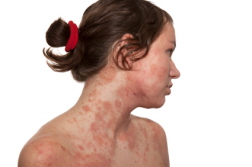 Here's the problem: Not everyone agrees with the FDA—and for once it's not the manufacturer taking issue with the FDA's decision. The American Academy of Dermatology (AAD) issued a statement shortly after the black box warning was issued, disagreeing with the FDA's position. At the time, in January 2006, AAD President Clay J. Cockerell MD said, "The American Academy of Dermatology disagrees with this action taken by the FDA. We believe that the data does not prove that the proper topical use of pimecrolimus and tacrolimus is dangerous.
Here's the problem: Not everyone agrees with the FDA—and for once it's not the manufacturer taking issue with the FDA's decision. The American Academy of Dermatology (AAD) issued a statement shortly after the black box warning was issued, disagreeing with the FDA's position. At the time, in January 2006, AAD President Clay J. Cockerell MD said, "The American Academy of Dermatology disagrees with this action taken by the FDA. We believe that the data does not prove that the proper topical use of pimecrolimus and tacrolimus is dangerous."Because these medications are applied to the skin, virtually none of it gets inside the body. It's not the same as taking a pill. These are valuable medications, and if used properly, they allow millions of our patients with eczema to live normal lives."
However, Dr. Peter M. Elias of the Dermatology Service, Veterans Affairs Medical Center, and Department of Dermatology, University of California, suggested in a paper posted on the National Institutes of Health's PubMed Central that there appears to be a viable reason why the FDA adopted that stance.
While Elidel is approved for use in children two years of age and up, "the direct-to-consumer and physician-to-provider promotional activities that accompanied the marketing of Elidel and Protopic lead to widespread use of these agents in children with AD under the age of two years (outside their approved labeling)," Dr. Elias wrote.
"Even critics of the FDA's imposition of 'black box' warnings on Elidel and Protopic acknowledge the strong causal link between systemic (internal) use of these agents and the development of both lymphatic cancers (lymphomas) and light-induced skin cancers."
Dr. Elias notes that the current debate centers on long-term, topical use of these drugs. He notes that cases have been reported to the FDA in which cancers have developed directly at the site of prolonged Elidel use or in draining regional lymph nodes.
READ MORE ELIDEL LEGAL NEWS
Reports of tumors to the FDA have been linked to both the duration of Elidel therapy and the amounts of the Elidel applied to the site. "Logically, then the longer drug use, or the higher the drug concentration, the greater the likelihood of developing cancer," Dr.Elias notes. It should be noted that the focus of his paper was on a rationale for Barrier Repair Therapy.The FDA last discussed Elidel during a meeting on March 22 of the Pediatric Advisory Committee. For now, the FDA says that Elidel and other meds in its class should only be used as a last resort, and then only for a limited time—and certainly not for regular, ongoing maintenance of atopic dermatitis.
While critics of the FDA position, including the AAD and the National Jewish Medical and Research Center maintain that Elidel and products in its class are safe and effective when used as directed, the FDA is standing firm. "It may take human studies of ten years or longer to determine if use of Elidel is linked to cancer," the agency warns consumers.




